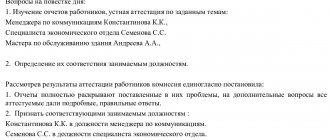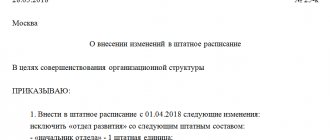Article 81 of the Labor Code of the Russian Federation lists cases in which an employer can dismiss an employee on his own initiative. In particular, paragraph 3 of this article indicates the possibility of dismissing an employee due to his inadequacy for the position held or the work performed. Such a discrepancy means the employee’s inability to perform his job duties (work).
ATTENTION : payment of severance pay upon dismissal under clause 3 of Article 81 of the Labor Code of the Russian Federation is not provided.
Our labor lawyer will help you challenge or carry out the procedure for dismissal for inadequacy of the position held, and will explain how to resign without working off: we protect the rights of the employee or employer professionally, on favorable terms and on time.
The legislative framework
Russian legislation provides for the possibility of terminating an employment relationship at the initiative of the employer, indicating the reason - inconsistency with the position held ( clause 3, part 1, article 81 of the Labor Code of the Russian Federation). This reason indicates a lack of professional skills and knowledge that are necessary for high-quality performance of duties in a specific position.
Important! Dismissal of an employee is possible only if his incompetence is confirmed by the results of certification.
According to the current Labor Code, dismissal due to inadequacy of the position held occurs according to the following scheme:
- Employee certification . The employer must have confirmation that the employee does not have the knowledge, skills and experience that the position required of him.
- Provide the employee with the opportunity to move to another position that matches his qualifications. Such a transfer becomes legal only with the written permission of the employee.
- Carry out the procedure for dismissing an employee if he refuses to be transferred to another job or there are no available vacancies for him. Dismissal must be agreed upon with the trade union organization.
When dismissal is unacceptable
The current legal regulations provide for a number of restrictions prohibiting the use of this basis in relation to a certain group of employees . As a rule, this group of workers is included in the category of persons who have additional social protection from the state. That is why the administration of each company needs to carefully study the list of beneficiaries who cannot be fired due to non-compliance with professional standards.
First of all, the law prohibits terminating an employment contract with those employees who are on annual leave. The procedure in question can be initiated only after the employee returns to fulfilling his obligations. Sending notices of termination to furloughed employees is a serious offense, subject to penalties for management and officers. This rule also applies to those employees who are on sick leave due to temporary disability. In this case, the employer is prohibited from using any grounds for dismissal until the employee returns to work.
Pregnant workers also fall into the category of beneficiaries. Current legal norms prohibit the dismissal of this category of workers, regardless of the reasons and grounds for making this decision. The only exception is when a business is closed. A similar rule applies to single mothers raising children under fourteen years of age.
Insufficient degree of highly professional training, low theoretical knowledge, failure to complete the necessary training can play a decisive role in certification
How to confirm the inadequacy of a subordinate for the position held
Certification results are a mandatory and integral condition for removal from a position due to lack of qualifications. At the legal level, its procedure is regulated only for certain groups of workers, mostly for civil servants. Commercial organizations must have internal organizational documents that set out the rules for conducting certification.
All employees must familiarize themselves with this document against signature . Certification becomes possible if an employee has been working in one position for at least a year . Accordingly, if this point is not reflected in the company’s internal documents and is not observed in practice, then you can appeal against such certification due to a violation of the law.
An employee's inadequacy for the position held can be determined after certification . Let's take a closer look at this process:
- Issued order on her carrying out. It must be reviewed by the appropriate employee. From passing the test the employee may refuse only in two cases:
- If the company's certification regulations violate the law ;
- The employee belongs to the category of personnel that is prohibited from dismissal under this article.
- Creation of a commission . The number of its participants is specified in internal documents. If this clause is violated, then this is grounds for appealing the decision in court. It should include representatives of the trade union, if there is one in the company. In order to comply with independent verification, third party experts may be invited.
- The tested employee is given a task corresponding to his job responsibilities, which must be completed in a limited time. It is important to understand adequate test turnaround times. If, in the opinion of the subject, the time is deliberately set too short, he can appeal this to the labor inspectorate and challenge the result in court.
- A final report is drawn up . It can be in favor of the employee, if the task is completed efficiently, and accordingly the employee remains in his position. If the result is unsatisfactory, the employee is transferred to another position or a decision is made to dismiss him for inadequacy for the position held.
Attention! Together with the final report, it is necessary to consider other documents that indicate poor performance by the employee of his official duties, for example, violation of production standards, production of defective products, and others.
It is important for the employer to remember that it is better to conduct a competency test
for a group of employees, rather than for one, so that the certification does not have any signs of discrimination.
Upon appeal, the court may declare the dismissal unlawful if disciplinary sanctions applied to the employee or there were no written violations , and the employee regularly received bonuses for quality work.
If the manager is not satisfied with the education of an employee who has been working for more than one year, then the court may consider that he has enough experience to effectively perform his official duties and there are no grounds for his dismissal.
How to conduct certification
The algorithm for organizing certification is as follows:
- Issue an administrative document on the procedure and the creation of a commission for taking examinations with approval of its composition. The order must list the employees who should undergo certification and set its dates.
- The immediate supervisor should write a motivated review and familiarize the employee with this paper.
- Send the employee a notice of the need to undergo certification at least 2 months before the procedure.
- The commission must begin work if at least 2/3 of the established composition is present at the exam.
- The person being certified must attend the meeting in person. If this is not possible, for a good reason, the date can be postponed to another day; for an unjustifiable reason, a penalty can be declared and either the procedure can be carried out without the employee, or the assessment can be postponed.
- At the end of the survey, the commission makes a decision. As a rule, this happens in the absence of the employee.
- As a result, the assessment may be as follows: corresponds to the position or does not correspond to the position (then it is possible to offer another, with a demotion and, in case of refusal, dismissal under clause 3 of Article 81 of the Labor Code of the Russian Federation).
- The commission secretary draws up a protocol and fills out an attestation sheet.
- The employee gets acquainted with the documents and signs them.
- Documents with the results of the procedure are stored in the personal file.
- The results of the certification are approved by the order of the manager, which is familiar to all participants.
- An employee who does not agree with the results has the right to protest by filing a complaint with the labor dispute review commission, or, in its absence, with the labor inspectorate or the court.
Dismissal will be a violation if:
- the organization does not have provisions for certification;
- the assessment was carried out in violation of procedures;
- the procedure was not carried out at all.
If one of these three conditions is true, all further actions to terminate the contract make no sense, since the dismissal will be illegal.
Who is prohibited from being fired for non-compliance?
will not be fired due to non-compliance :
- women if she is pregnant at the time of dismissal;
- women raising a child/children under three years of age;
- single mothers who have a child under 14 years of age or with disabilities under 18 years of age;
- workers who independently raise children under 14 years of age or a disabled child under 18 years of age;
- the sole breadwinner of a child with disabilities under 18 years of age;
- employee if at the time of dismissal he is suspended from work for health reasons with a sick leave certificate or is on vacation.
What does the law say?
The Labor Code of the Russian Federation clearly states that non-compliance with the position held means that the employee lacks the necessary knowledge and skills to perform official duties. In some cases, this is not the employee's direct fault. He may not be able to do the job due to health reasons.
The management of the enterprise does not have the right to terminate the employment agreement with a young specialist, relying on Article 81 of the Labor Code of the Russian Federation. Since the citizen has just settled and, accordingly, does not yet have the necessary skills. The exception is employees who do not have a specialized education, as a result of which the company incurs significant losses. In other situations, dismissal for inadequacy of the position held is quite possible.
Is dismissal allowed based on an independent qualification assessment?
The Labor Code of the Russian Federation has a clause on independent assessment of qualifications (NOC) (Article 196 of the Labor Code of the Russian Federation). If there is consent from the employee , the employer can additionally send him to undergo an independent commission , which will give an opinion on the professional knowledge and skills of the employee. The NOC conducts a qualification assessment center.
It is important to note that an employer does not have the authority to dismiss an employee solely based on the results of an independent assessment of his competence.
Reference! Due to the employee’s inadequacy for the position held, it is possible to terminate the employment relationship with him only after certification. In this case, the employer can make an independent assessment of qualifications one of its stages.
How to prove that an employee is not suitable for the position?
If an employer plans to terminate cooperation with one of his subordinates due to a lack of certain skills, then he will need to prove the employee’s incompetence at the job he is performing.
Prerequisites for recertification of an employee may be:
- Sustaining an injury that makes it impossible to fully perform your duties.
- Regular deterioration in the quality of an employee’s work.
- Failure to implement the plan required by the enterprise.
- Re-equipment of offices and workshops, which require completely different qualities and skills.
Information
There can be many examples of inconsistency, for example, a citizen works as a loader, but gets a back injury and subsequently does his job worse or slower, which in turn will not suit the employer and will lead to the idea of dismissal. Another situation may be the installation of new software in offices where an employee with a Soviet education works, and for normal work activities she needs to take courses to improve her qualifications or be fired due to insolvency.
Evidence of non-compliance is achieved by:
- Knowledge certification.
- Medical examination.
Attention
The employer must take into account the fact that the requirements for a particular position must be specified in the employment contract and in a document such as job descriptions.
For example, if a cook is allergic to dishwashing detergents, they will not be able to fire him due to non-compliance, because job descriptions do not include washing kitchen utensils. Another option for the impossibility of dismissal under Article 81 (clause 3) may be the lack of knowledge of car repair by a full-time driver.
The procedure for registering dismissal due to non-compliance
If the results of the measures taken turn out to be disappointing and low qualifications are confirmed, then dismissal can be filed due to inadequacy of the position held. This procedure looks like this:
- Offer another position that matches the employee’s skills and experience; if he refuses, the refusal must be certified in writing.
- Issue an order to terminate the employment relationship and familiarize the employee with it against receipt. The basis is the order to conduct certification, the minutes of the meeting of the relevant commission.
- Obtain the consent of the trade union if we dismiss its member. Approval will not be required only if the union does not respond within 7 days from receiving a copy of the dismissal order or does not provide reasons for the refusal.
- Make an entry in the work book about the reason for dismissal, which must be justified in the Labor Code.
- Issue wages, compensation for unused vacation and other amounts due on the last working day, along with other required documents.
According to Art. 392 of the Labor Code of the Russian Federation, an employee has the right to appeal the decision of the certification commission within three months from the moment he was notified of its results.
Important! The decision to dismiss is subject to appeal within one month from the moment the employee is given a copy of the dismissal order or issuance of a work book.
In what situations will you have to go to court?
A worker who does not agree with the decision of the certification commission can file a complaint with a judicial authority in order to consider the legality of the actions of the company administration . Proper compliance with all formalities of the process under consideration allows the company’s management to minimize the risks of such conflicts. It should be understood that most often the court takes the side of the person who filed the claim. The reason for making such a decision is the identification of facts indicating a violation of the certification procedure. Below we propose to consider a list of the main mistakes that may allow an employee to challenge management’s decision:
- The fact that there are no necessary local acts regulating the employee certification process.
- Violation of established local standards regarding certification tests.
- The fact of the absence of job descriptions, which caused the employee’s lack of knowledge about the features of the position held.
- Lack of information on the purpose of certification activities.
- Setting internal standards that contradict current legal norms.
- Differences in qualification requirements for employees occupying the same job positions.
Only the conclusion of the certification committee can become the basis for dismissing an employee due to non-compliance.
Identification of any of the above facts indicates that the decision made by management is biased. Another common reason for conflicts is the fact that the company administration did not offer the dismissed worker another position. The situation in which there are no additional documents confirming the results of the decision of the certification commission deserves special attention. Such documents may be complaints against a specific employee, internal memos, or acts confirming the imposition of penalties for violation of discipline.
Judicial practice shows that during the trial, additional circumstances may be identified that may be regarded as a gross violation of the law. It is for this reason that many companies refuse to use such reasons for dismissal. Experts recommend using this article of Labor legislation only in cases where company management regularly conducts checks of employees to determine their suitability for their position. In other situations, it is recommended to use more “safe” reasons for terminating an employment agreement.
Sample entry in a work book
A work book is an official document. It is filled out in accordance with the current Instructions.
The recording of dismissal for non-compliance is carried out as follows:
- You should deviate one line from the previous entry.
- Continuous numbering is used. That is, the dismissal record is assigned the next sequential number.
- The date of dismissal is entered in the “date” column.
- Next, you need to specify the reason for dismissal. PICTURE
- The number and date of the dismissal order are entered in the appropriate column.
- The final entry is the signature of the manager or responsible person. For the entry to have legal force, the person’s surname is clearly written down and the signature is sealed.
After completing this, all that remains is to make an entry in the labor book movement journal. The delivery of a work book to a dismissed employee is confirmed by his signature in the journal.
Categories
This article will discuss how to correctly carry out the procedure to identify an employee’s inadequacy for the position held and competently dismiss him without adverse legal consequences for the employer. In addition, an example is given from judicial practice with interesting nuances of the case.
Dismissal based on certification results. General provisions
The Labor Code of the Russian Federation provides for “termination of an employment contract at the initiative of the employer” (Article 81). The mentioned article contains a number of parts with clauses, including clause 3, part 1, art. 81 about the employee’s inadequacy for the position held or the work performed due to insufficient qualifications confirmed by certification results.
The procedure for certification is established by labor legislation and other regulatory legal acts containing labor law norms, local regulations adopted taking into account the opinion of the representative body of workers (Part 2 of Article 81 of the Labor Code of the Russian Federation).
Dismissal on the grounds provided for in paragraph 3 of part 1 of the above article is permitted if it is not possible to transfer the employee with his written consent to another job available to the employer (either a vacant position or a job corresponding to the employee’s qualifications, or a vacant lower position or lower paid work) that the employee can perform taking into account his state of health. In this case, the employer is obliged to offer all vacancies available in the given area that meet the specified requirements. The employer is obliged to offer vacancies in other localities if this is provided for by the collective agreement, agreements, or employment contract.
It should be noted that the letter of Rostrud dated April 30, 2008 No. 1028-s “On the dismissal of an employee due to insufficient qualifications” states that the dismissal of an employee on the above grounds is not allowed without certification .
There is no definition of the concept of “certification” in the Labor Code of the Russian Federation. However, this term is found in the Labor Code of the Russian Federation in different meanings. So, for example, in Art. 173, art. 174 we are talking about examination tests in an educational institution. Employee certification rule a comprehensive check of the level of business, personal, and sometimes moral qualities of an employee for the corresponding position in modern working conditions.
The main objectives of certification are:
- checking the professional level and skills, business qualities and/or specialized theoretical knowledge of employees;
- the ability to apply them when performing the functions specified in the employment contract;
- formation of highly qualified personnel.
It is with the help of certification that you can determine which employees need training and who can be transferred to a higher position.
At the moment, there is no regulatory legal act at the federal level that would regulate the general rules, terms, categories of employees, as well as other issues related to personnel certification. However, it should be noted that there are separate acts on this procedure for certain categories of workers in which the state is interested, in particular:
- state civil servants (Article 48 of the Federal Law of July 27, 2004 No. 79-FZ “On the State Civil Service of the Russian Federation” (as amended on April 2, 2014));
- scientific and pedagogical workers (Article 332 of the Labor Code of the Russian Federation, Article 49 of the Federal Law of December 29, 2012 No. 273-FZ “On Education in the Russian Federation” (as amended on July 21, 2014), Decree of the Government of the Russian Federation of September 24, 2013 No. 842 “On the procedure for awarding academic degrees” (as amended on July 30, 2014) (together with the “Regulations on the awarding of academic degrees”));
- experts in the field of special assessment of working conditions (Article 351.3 of the Labor Code of the Russian Federation, Federal Law dated December 28, 2013 No. 426-FZ “On special assessment of working conditions” (as amended on June 23, 2014));
- prosecutorial employees who have class ranks or occupy positions for which the assignment of class ranks is provided (clause 2 of Article 41 of the Federal Law of January 17, 1992 No. 2202-1 “On the Prosecutor’s Office of the Russian Federation” (as amended on July 21, 2014));
- aviation personnel (clause 2 of article 8 of the Air Code of the Russian Federation dated March 19, 1997 No. 60-FZ (as amended on April 20, 2014));
- rescuers (Articles 23, 24 of the Federal Law of August 22, 1995 No. 151-FZ “On Emergency Rescue Services and the Status of Rescuers” (as amended on July 2, 2013));
- persons holding positions related to ensuring the safety of navigation, flights and the movement of ground vehicles (clause 9 of the Government of the Russian Federation of August 30, 1993 No. 876 “On measures to ensure the sustainable operation of aviation, sea, river and road transport in 1993” ( as amended on October 16, 2000), Order of the Ministry of Transport of the Russian Federation, the Ministry of Labor of the Russian Federation dated March 11, 1994 No. 13/11 “On approval of the Regulations on the procedure for certification of persons holding positions of executive managers and specialists of transport enterprises” (as amended on May 11, 2000) );
- library workers (Article 26 of the Federal Law of December 29, 1994 No. 78-FZ “On Librarianship” (as amended on July 2, 2013));
- workers of a hazardous production facility (Clause 2 of Article 9 of the Federal Law of July 21, 1997 No. 116-FZ “On the Industrial Safety of Hazardous Production Facilities” (as amended on July 2, 2013));
- heads of unitary enterprises (clause 2 of article 21 of the Federal Law of November 14, 2002 No. 161-FZ “On State and Municipal Unitary Enterprises” (as amended on December 28, 2013)).
Unlike the specialists listed above, for whom certification is a mandatory procedure, in commercial organizations it is voluntary and carried out on the initiative of management.
It is important to take into account that the Labor Code of the Russian Federation provides for categories of employees who are not subject to dismissal based on the results of certification (since this is dismissal at the initiative of the employer), therefore, conducting certification in relation to such employees either does not make sense, or is relevant only for the purpose of increasing wages , in position, etc.
According to Art. 261 of the Labor Code of the Russian Federation, “termination of an employment contract with a pregnant woman, with a woman with a child under the age of three, with a single mother raising a disabled child under the age of eighteen or a young child - a child under the age of fourteen, with another person raising these children without a mother, with a parent (other legal representative of the child) who is the sole breadwinner of a disabled child under the age of eighteen or the sole breadwinner of a child under the age of three in a family raising three or more young children, if the other parent ( other legal representative of the child) is not in an employment relationship, at the initiative of the employer is not allowed.”
Dismissal of employees who meet these criteria based on the results of the certification and on the basis of clause 3, part 1, art. 81 of the Labor Code of the Russian Federation will be considered illegal .
In addition, the employer must be aware of general restrictions that also do not allow dismissing an employee under clause 3, part 1, art. 81 Labor Code of the Russian Federation. So, according to Part 6 of Art. 81 of the Labor Code of the Russian Federation, the following cannot be dismissed in the usual manner:
- employees on leave, regardless of its type;
- workers during periods of temporary incapacity.
However, it should be remembered that there are certain categories of workers who can be dismissed under the above article, but only in accordance with the application of certain special procedures in accordance with the Labor Code of the Russian Federation:
- workers who are members of a trade union (Part 2 of Article 82 of the Labor Code of the Russian Federation);
- representatives of employees during collective bargaining (Part 3 of Article 39 of the Labor Code of the Russian Federation);
- workers under the age of 18 (Article 269 of the Labor Code of the Russian Federation);
- representatives of workers participating in the resolution of a collective labor dispute (Article 405 of the Labor Code of the Russian Federation);
- workers participating in a collective labor dispute or a strike (Article 415 of the Labor Code of the Russian Federation);
- workers elected to labor dispute commissions (Articles 171, 373 of the Labor Code of the Russian Federation);
- heads (their deputies) of elected collegial bodies of primary trade union organizations, elected collegial bodies of trade union organizations of structural divisions of organizations - not lower than workshops and equivalent to them (Articles 374, 376 of the Labor Code of the Russian Federation).
Features of certification
To carry out certification, it is necessary to develop and approve a regulation (local normative act) on certification.
When developing a draft local act, the employer has the right to use as a recommendation document Resolution of the State Committee for Science and Technology of the USSR No. 470, State Committee for Labor No. 267 of 10/05/1973 “On approval of the Regulations on the procedure for certification of management, engineering and technical workers and other specialists of enterprises and organizations of industry, construction, agriculture economy, transport and communications" (together with the "Standard list of positions of management, engineering and technical workers and other specialists in industry, construction, agriculture, transport and communications and other sectors of the national economy, subject to certification in accordance with the Resolution of the Council of Ministers of the USSR of July 26 1973 No. 531, approved by Resolution of the State Committee for Science and Technology of the USSR, State Committee for Labor of the USSR dated October 22, 1979 No. 528/445) (as amended on November 14, 1986; hereinafter referred to as the Regulations). This Regulation must be applied taking into account Art. 423 Labor Code of the Russian Federation. The developed certification regulations must be approved by the head of the organization.
The main stages of preparation and certification are the following:
- issuing an order for certification;
- creation of a certification commission;
- coordination of the certification schedule;
- familiarization against signature of the entire working team and each newly hired person (according to Part 3 of Article 68 of the Labor Code of the Russian Federation);
- preparation of necessary documents for the work of the certification commission;
- approval of the preparatory list of questions for certification tasks;
- carrying out certification;
- summarizing.
Certification can be carried out either planned, in accordance with the schedule approved by the certification commission or the head of the organization, or unscheduled - on the initiative of the employee himself or his manager.
The timing of scheduled certification for employees, as a rule, does not exceed once every three to five years.
The organization sets the deadline for certification independently, depending on the number of employees subject to certification, the possibility of carrying it out in one or several departments at the same time, and other factors. The forms of certification are selected depending on the specifics of the profession of the person being certified. Thus, it could be a written exam, testing, a practical task (problem solving), making a sample (glassblowing).
One of the most important points when preparing certification is the evaluation criterion. On its basis, the qualification level of the certified workers is assessed and the correspondence of this level to the work performed is established.
Such criteria may include the following:
- compliance with the qualification requirements for the position being filled, approved in the prescribed manner;
- determining the employee’s participation in solving the tasks assigned to the relevant structural unit;
- the complexity of the work he performs;
- results of the employee’s performance of the job description;
- undergoing advanced training and professional retraining.
As an example for the development of evaluation criteria and their documentation, the Regulations on the procedure for certification of employees of the Pension Fund of the Russian Federation, approved. Resolution of the Board of the Pension Fund of the Russian Federation dated January 15, 2007 No. 5p. This document presents a scale for assessing the professional, business, moral and psychological qualities of an employee and the characteristics of a manager being certified in points, a table of criteria for assessing the certified person, as well as a description of the criteria for assessing the certified person at four levels of the scale. Also, the criteria can be determined in accordance with the requirements for specialties established in the Qualification Directory of Positions of Managers, Specialists and Other Employees, approved. Resolution of the Ministry of Labor of the Russian Federation dated August 21, 1998 No. 37 (as amended on February 12, 2014).
Based on the established criteria, appropriate test forms, examination questions, etc. are developed.
The certification process is recorded in a protocol , which indicates all the information about its implementation, information about the person being certified and assessments of his qualifications. The results of the event are documented in writing as attachments to the protocol.
At the end of the certification, the commission conducts a discussion and makes a decision on each employee in the manner established by the regulations (this can be an open or closed vote, in the presence or absence of the employee). The decision made based on the results of the certification and reflected in the protocol is communicated to employees against signature within the time period specified by the regulations. It is advisable to provide in the regulations that the meeting of the certification commission will be considered valid if at least two thirds of its members are present.
The results identified during the certification can be recorded in the employee’s personal card in the appropriate section. If the personnel service uses the unified form No. T-2, then the following information is entered into section IV “Certification”: date of certification, decision of the certification commission and details of the basis document (protocol or other).
The employer needs to know that in accordance with Order of the Ministry of Culture of Russia dated August 25, 2010 No. 558 “On approval of the “List of standard management archival documents generated in the course of the activities of state bodies, local governments and organizations, indicating storage periods””, the storage period for minutes of meetings certification, qualification, tariff commissions, documents (protocols of counting commissions, secret ballot ballots) for them is 15 years, and in enterprises with difficult, harmful and dangerous working conditions, the storage period increases and is 75 years.
Before carrying out the certification, you should make sure that the necessary local regulations are in full order and that job descriptions/professional instructions have been drawn up for all positions in the organization with clear indications of the responsibilities that must guide the certified employee. Otherwise, if the employer decides to dismiss the employee based on the results of certification, and the dismissed employee subsequently goes to court with a claim for reinstatement at work, payment of wages for forced absence and compensation for moral damage, then in the absence of the necessary local regulations, including Job descriptions/professional instructions play an important role; the court may declare the certification results invalid and the dismissal of an employee illegal.
Arbitrage practice
So, let's look at two examples from judicial practice with opposing decisions made by the judicial panel.
In the first example, citizen A. went to court and filed a claim against the Federal State Budgetary Institution “National Park “V. Bor" (hereinafter referred to as the Federal State Budgetary Institution "National Park "V. Bor") with a request to invalidate the results of the certification, the order for his dismissal, and also to recognize the dismissal as illegal, reinstate him in his previous position with a salary according to the staffing table and recover from employer's average salary during forced absence.
Plaintiff's position
A. worked at the Federal State Budgetary Institution “National Park “V. Bor” from 03/01/2008 to 12/01/2013, where he held the position of head of the park security service. 09/01/2013 at the Federal State Budgetary Institution “National Park “V. Bor”, an extraordinary certification was carried out, according to the results of which he was recognized as an employee inappropriate for his position. Further, due to the lack of vacancies, the plaintiff was dismissed by Order No. 255/k dated December 1, 2013 on the grounds provided for in clause 3, part 1, art. 81 Labor Code of the Russian Federation.
A. believes that his dismissal is illegal, since the Order “On carrying out an extraordinary certification” dated August 1, 2013 No. 21-K/O did not indicate what exactly his violations were, or what documents from law enforcement agencies confirm the facts of these violations. Also, the plaintiff was not familiar with the documents regulating the certification procedure and objective assessment criteria.
Defendant's position
Representatives of the defendant A.O., acting on the basis of a power of attorney, objected to the satisfaction of the claims, motivating their arguments by the fact that the certification took place on a legal basis, in accordance with the regulations and all local regulations that existed at the time of the certification, with which the plaintiff was in advance familiarized
Court position
Based on clause 3, part 1, art. 81 of the Labor Code of the Russian Federation, an employment contract can be terminated by the employer if the employee is not suitable for the position held or the work performed due to insufficient qualifications confirmed by certification results. At the same time, dismissal on this basis is allowed if it is impossible to transfer the employee with his written consent to another job available to the employer (both a vacant position or work corresponding to the employee’s qualifications, and a vacant lower position or lower paid job), which the employee can perform taking into account his health status.
Part 2 of Art. 81 of the Labor Code of the Russian Federation stipulates that the certification procedure is established by labor legislation and other regulatory legal acts containing labor law norms, local regulations adopted taking into account the opinion of the representative body of workers.
The compliance of the actually performed duties and qualifications of employees with the requirements of job characteristics is determined by the certification commission in accordance with the regulations applied in the organization on the certification procedure.
Regulations on the certification of employees of the Federal State Budgetary Institution “National Park “V. Bor”, approved on February 1, 2013, established the grounds for conducting an extraordinary certification, defining the procedure and conditions for conducting certification of employees of a budgetary institution.
As follows from the case materials, A. was dismissed on December 1, 2013 from the post of head of the security service of the Federal State Budgetary Institution “National Park “V. Bor”, due to inadequacy of the position held due to insufficient qualifications, confirmed by certification results on the basis of clause 3, part 1, art. 81 Labor Code of the Russian Federation. The plaintiff is familiar with the dismissal order: the dismissal order No. 255/k dated December 1, 2013 bears his signature.
The court found that the plaintiff, having a special education, appropriate work experience, and having completed training in advanced training courses, at the time of certification could correspond to the position held.
The employer, in connection with the revealed facts of illegal logging of forest plantations and theft of wood on the territory of the park in the blocks assigned to the plaintiff, by order of the Federal State Budgetary Institution “National Park “V. Bor” dated 01.08.2013 No. 21-K/O, an extraordinary certification of employees was appointed, based on the results of which the certification commission decided that A. was not suitable for the position held. This was the basis for terminating the employment contract with him. The certification results are documented in the minutes of the meeting of the certification commission dated November 24, 2013 No. 38p, by order of the Federal State Budgetary Institution “National Park “V. Bor” “On the results of certification of national park employees” dated November 25, 2013 No. 26-K/O.
The date of the extraordinary certification of employees, the composition of the certification commission, the lists of employees subject to certification, as well as the action plan for the preparation and conduct of certification were approved by the defendant’s order No. 22-K/O dated August 10, 2013, which the plaintiff became familiar with on August 11, 2013, as evidenced by his signature on the said document.
Based on the results of the certification, a certification sheet was drawn up for employee A, which assessed his activities as inappropriate for the position held.
The court, refusing to satisfy A.’s claims , having examined the evidence presented by the parties, guided by the above rules of law, came to the reasonable conclusion that the plaintiff’s dismissal was carried out in accordance with the current labor legislation, and established that there were no violations of the dismissal procedure and procedure by the defendant.
In this case, the court proceeded from the fact that the extraordinary certification was carried out by the employer in accordance with the Regulations on the procedure for conducting certification. The plaintiff was familiarized with it on the date established by order of the head of the organization. During the certification process, the plaintiff was asked only questions related to the performance of his official duties. The plaintiff was promptly notified of the upcoming certification and was familiarized with the certification characteristics of the employees’ performance of official duties. After familiarizing himself with the characteristics of the objections regarding the information contained in them, A. did not declare or indicate to the certification commission additional information about his professional activities. In connection with this, the panel of judges considers the plaintiff’s arguments in this part to be unfounded.
The panel of judges agrees with the conclusions of the defendant's representatives regarding the objective assessment by the certification commission of the plaintiff's business and personal qualities, compliance with the procedure for conducting extraordinary certification, since these conclusions of the defendant's representatives are motivated and correspond to the circumstances established in the case.
Taking into account the employer’s lack of vacant positions corresponding to the employee’s qualifications, the assessment of the certification commission, the approval of the plaintiff’s dismissal with the trade union organization, the court’s conclusion on the legality of A.’s dismissal under clause 3 of part 1 of Art. 81 of the Labor Code of the Russian Federation is legal.
Taking into account that the request to reinstate A. at work was refused, the court rightfully left without satisfaction the demand to recover from the employer the average salary for the period of forced absence.
The panel of judges cannot take into account the arguments that the certification characteristics were not signed by the immediate supervisor of the plaintiff, since the official had the authority to draw up and sign the characteristics, delegated by the head of the Federal State Budgetary Institution “National Park “V. Bor”” when organizing preparatory work for certification dated August 10, 2013 No. 23-K/O.
In establishing the plaintiff’s awareness of the norms of the Regulations on the Certification of Workers, the court rightfully took into account a copy of the register of familiarization of employees of the Federal State Budgetary Institution “National Park “V. Bor” with local regulatory documents, where the plaintiff signed with his own hand, in connection with this, the judicial panel considers the arguments about the inadmissibility of accepting the specified document as evidence to be unfounded.
Based on the above, after listening to the positions of the plaintiff and defendant, the conclusion of the prosecutor of the prosecutor's office, checking the case materials, discussing the arguments and the prosecutor's objections regarding them, the judicial panel decided to deny citizen A.'s claim .
The second example shows us a different picture of the resolution of a legal dispute regarding a dismissed employee who did not pass certification.
So, a former employee of the medical institution LLC "M" Yu. filed a lawsuit against her former employer to declare her dismissal illegal, reinstate her in her previous position, and also demand to recover from the employer the average salary for the period of forced labor. absenteeism and pay compensation for moral damage in the amount of fifty thousand rubles.
Plaintiff's position
Yu. went to court with the above requirements, based on the fact that her dismissal was illegal. The plaintiff motivated her arguments by the fact that the certification commission was created by the decision of the head of this medical institution from doctors of other specialties working in the same institution. At the same time, the validity period of Yu’s qualification category has not expired.
Defendant's position
The defendant objected to the claims, citing the fact that conducting an extraordinary certification is not prohibited by law. The employer prepared this certification in accordance with all norms and rules in accordance with labor legislation.
Court position
The judicial panel, having listened to the arguments presented by the plaintiff and the defendant, having carefully studied the materials of the said case, decided to recognize the dismissal of the doctor, whose qualification category had not expired, based on the results of the certification carried out by the certification commission, created by the decision of the head of the medical institution from doctors of other specialties working in the same institution, illegal.
An employment contract can be terminated by the employer, including if the employee is not suitable for the position held or the work performed due to insufficient qualifications confirmed by the results of certification (clause 3, part 1, article 81 of the Labor Code of the Russian Federation). At the same time, the procedure for conducting certification is established by labor legislation and other regulatory legal acts containing labor law norms, local regulations adopted taking into account the opinion of the representative body of workers (Part 2 of Article 81 of the Labor Code of the Russian Federation). If certification has not been carried out, the employer does not have the right to dismiss an employee on this basis (clause 31 of the Resolution of the Plenum of the Supreme Court of the Russian Federation dated March 17, 2004 No. 2 “On the application by the courts of the Russian Federation of the Labor Code of the Russian Federation” (as amended on September 28, 2010)).
Medical workers have the right to basic guarantees provided for by labor legislation and other regulatory legal acts of the Russian Federation, including certification to obtain a qualification category in the manner and within the time frame determined by the authorized federal executive body (clause 4, part 1, art. 72 of the Federal Law of November 21, 2011 No. 323-FZ “On the fundamentals of protecting the health of citizens in the Russian Federation” (as amended on July 21, 2014; hereinafter referred to as Federal Law No. 323-FZ)). Consequently, the timing of certification cannot be set arbitrarily.
Certification is carried out once every five years. The assigned qualification category is valid throughout the Russian Federation for five years from the date of publication of the administrative act on assignment (clause 5 of the Procedure and deadlines for medical workers and pharmaceutical workers to undergo certification for obtaining a qualification category, approved by Order of the Ministry of Health of Russia dated April 23, 2013 No. 240n ( further - Order)).
Approval of the procedure for certification of specialists with higher and secondary medical education for assigning them a qualification category falls within the competence of the Ministry of Health of Russia (clause 12, part 2, article 14 of Federal Law No. 323-FZ, clause 1 of the Regulations on the Ministry of Health of the Russian Federation, approved Decree of the Government of the Russian Federation dated June 19, 2012 No. 608 (as amended on July 16, 2014)).
The procedure for certification of medical workers does not provide for the right of the head of a medical institution to create a certification commission by his order, since the defendant is not a government body and is not vested with the authority to establish the procedure for certification of medical workers and, accordingly, did not have the right to issue relevant local acts.
The certification commission must include specialists with high qualifications and knowledge necessary to conduct a qualification exam in the specialties of the persons being certified (clauses 14, 17 of the Procedure).
From the above it follows that in this case the certification commission was created by the decision of a person who does not have the relevant competence, the terms of certification were violated, the commission did not include persons with the same specialty as the person being certified, that is, persons with the necessary knowledge for assessing the qualifications of the person being certified. Thus, the dismissal of the doctor in this case was carried out without proper certification and is illegal.
Court statement
The panel of judges ruled that the claim of citizen Yu. should be satisfied in full . Recognize the dismissal under clause 3, part 1. Art. 81 of the Labor Code of the Russian Federation is illegal to reinstate a former employee of M LLC in his previous position with the same salary in accordance with the staffing table. To recover from the defendant in favor of the plaintiff the average salary for the period of forced absence, as well as to pay compensation for moral damage in the amount of fifty thousand rubles.
As we can see from the above court decisions, in the first case the employer acted within the scope of his powers, scrupulously observing all the rules, therefore the employee’s claims were not satisfied by the court. In the second case, the employer grossly exceeded his authority, which served as the basis for satisfying the claim in full, including a claim for compensation for moral damage.
What are the grounds for dismissal?
All grounds on which a person can be dismissed from their position are divided into several categories:
- An employee may hold a position, but at the same time be on sick leave for a long time. It is very difficult to dismiss a worker for this reason; in this case, he must have a very long disability, and if his illness is curable, then the employee is not subject to dismissal.
- The second reason is the low level of qualifications. Here the employer may also face significant problems. The fact is that an employee can file an application for consideration in court, because not everyone is satisfied with such wording as dismissal for inadequacy of the position held. In order for an employee to constantly improve his skills, the employer must send him to special courses. If, however, the employee does not improve his qualifications, then in this case it would be appropriate to conduct a certification to test the knowledge and skills of the organization’s employee. Certification consists of exams that are divided into two types: mandatory and at the request of management. For example, doctors must undergo mandatory certification within a certain period, and if the results are negative, they are fired based on the results of the certification. The inconsistency with the position held, as they say, is obvious in this case.








